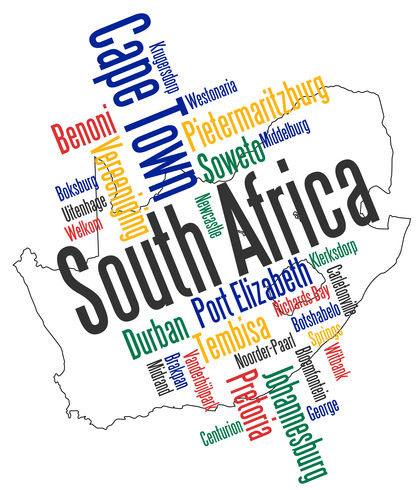South Africa - International trade

South Africa's trade and industrial policy is moving away from a highly protected, inward looking economy towards an internationally competitive economy, capitalizing on its competitive and comparative advantages. For years, South Africa's ability to trade with the outside world was severely limited by the sanctions placed on
| Trade (expressed in billions of US$): South Africa | ||
| Exports | Imports | |
| 1975 | 8.719 | 8.226 |
| 1980 | 25.525 | 19.598 |
| 1985 | 16.293 | 11.319 |
| 1990 | 23.549 | 18.399 |
| 1995 | 27.860 | 30.555 |
| 1998 | 26.322 | 29.268 |
| SOURCE: International Monetary Fund. International Financial Statistics Yearbook 1999. | ||
the country by most developed countries as a punishment for South Africa's commitment to apartheid. With the end of apartheid in the early 1990s, international trade has expanded dramatically so that in 2000 international trade constituted 16 percent of the GDP.
South Africa's economy is still largely reliant on the export of primary and intermediate commodities to industrialized countries. However, manufactured goods account for about 70 percent of exports to Africa. Net gold exports are responsible for a large part of foreign exchange earnings. Earnings from this source, however, fluctuate with the shifting international gold price. Imports mainly consist of capital goods , raw materials, semi-manufactured goods (approximately 76 percent of total trade imports), and consumer commodities.
South Africa maintains formal trade relations with various countries by means of treaties, trade agreements, and membership in international trade institutions. The centerpiece of South Africa's foreign economic policy is the Southern African Development Community (SADC), comprising Angola, Botswana, the Democratic Republic of Congo (DRC), Lesotho, Malawi, Mauritius, Mozambique, Namibia, Seychelles, South Africa, Tanzania, Zambia, and Zimbabwe. The government's key policy objective is to strengthen trade and investment linkages between South Africa and the other SADC countries.
Trade with SADC countries increased dramatically during the period 1988 to 1997. At present, the ratio of South Africa's exports to imports to SADC countries stands at 6:1. Exports to the region are concentrated in high value-added sectors, such as minerals and base metals, chemicals, machinery, transport equipment, and food and beverages. The most important SADC purchaser of South African exports is Zimbabwe, followed by Mozambique, Zambia, Mauritius, Malawi, Angola, and Tanzania. Zimbabwe is also the largest source of imports, followed by Malawi, Angola, Zambia and Mozambique. The member states of the SADC are negotiating a Free Trade Agreement (FTA) to strengthen trade, investment, and industrial linkages within the region.
Europe is the biggest source of trade for South Africa. In fact, 7 out of 10 of South Africa's top trading partners are European countries. Britain is South Africa's largest single trading partner. British exports to South Africa were worth R14 billion in 1998 while South African exports to Britain totaled R22 billion. Trade between Germany and Africa rose in 1997: German exports to South Africa were valued at DM5.9 billion in 1997, while German imports from South Africa were up almost 16 percent to R9 billion in 1998. There has been a steady increase in bilateral trade between France and South Africa, and at the end of 1998, France was the fifth largest supplier of goods to South Africa. South African exports to France totaled more than R2 billion. Bilateral trade between South Africa and Switzerland is worth R6.384 billion a year. Almost 400 Swiss companies are represented in South Africa. Italy is one of the top 5 major trading partners of South Africa, with the 2-way trading relations amounting to R8 billion in 1997. In March 1999, South Africa concluded an historic trade agreement with the European Union (EU) that will result in the abolition of tariffs on more than 90 percent of trade between the 15 EU countries and South Africa within 12 years.
The United States is another of South Africa's largest trading partners. South Africa is a beneficiary of the U.S. Generalized System of Preferences (GSP), which grants duty-free treatment for more than 4,650 products. South Africa's exports to the United States increased from R5.2 billion in 1993 to R14.8 billion in 1998. South Africa also has important trading relations with Japan, South Korea, and countries in South America.
In 2000 South Africa enjoyed a trade surplus of US$3.2 billion on exports of US$30.8 billion and imports of US$27.6 billion.
My name is Morne Lyon. I am a economics student in South-Africa and I have a a few questions I think you can help me with.
I want to know -in your opinion- if a country's wealth is directly linked to the level and quality of its international trade activity and can you give me an practical example to support your views?
Do u agree that a more liberalised international trade environment improves people's lives throughout the world and do you think individuals benefit from a more liberalised trading environment?
Also with reference to the many economic challenges that South Africa faces at present, do you think it would be preferable for the country to emphasise its developing country status (and thereby attract more trade preferences from bilateral and regional trading partners) or work towards developing a more developed country image in the eyes of other countries?
please give reasons for your views.
Thank you for taking the time to read this email. I am looking forward to hearing from you.
Morne
thank you
Can SA afford to have totally free trade with the rest of the world?
I'd also like to know more about how current technology evolution will affect international trade in South Africa